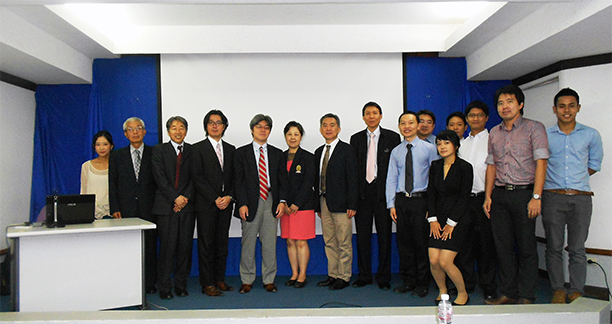The 3rd PARI-ERI Joint Workshop Flash Report
The 3rd PARI-ERI Joint Workshop Detailed Report
Oct. 2, 2014

ASEAN Connectivity: Power Integration between Thailand and Myanmar
| [Date] | Thursday, October 2, 2014 |
|---|---|
| [Venue] | Energy Research Institute (ERI), Chulalongkorn University, Bangkok |
| [Co-hosted by] | Energy Research Institute (ERI), Chulalongkorn University Policy Alternatives Research Institute (PARI), the University of Tokyo |
| [Supported by] | Economic Research Institute for ASEAN and East Asia (ERIA) |
Objective
This workshop on energy development in Myanmar aimed to do the following:
- understand current barriers to investment in ongoing power projects in Myanmar and how they can be removed;
- introduce relevant achievements of the ERI/PARI joint research project
- kick-off the new ERI/PARI joint research project focused on Salween River Development
Outline
Ever since the opening up of Myanmar’s economy, the country has achieved remarkable progress. However, compared to its economic boom, the country’s energy development has lagged behind. Energy strategy holds the promise of further progress for the country. Toward this end, PARI has held stakeholder meetings in collaboration with ERIA.
It is a fact that the country cannot achieve energy development without sound global/regional linkages. By focusing on the energy relationship with richer neighboring countries, this workshop attempts to address barriers and their removal with regard to power integration with Myanmar.
To obtain directions for further research in its focus area, the workshop discussed the following issues: What are the barriers to power integration with Myanmar? What kind of win-win situation could be envisaged through power integration? What kind of energy policies/regulations are required in order to achieve that win-win situation?
Summary
The morning session opened with Ms. Dawan (Vice Director, ERI, Chulalongkorn University) delivering her welcome address. This was followed by Prof. Ichiro Sakata’s (Director, PARI) opening speech where he shared the rationale and research topics of the ERIA project. He explained Myanmar’s focus on rural electrification. He also touched upon PARI’s ongoing endeavor in the area of human resource development in Myanmar. The main topic in the morning session was the introduction of PARI’s achievements in quantitative research—Mr. Seino (Project Researcher, PARI) gave details of the “Demand Projection Study” and Mr. Sasaki (Project Researcher, PARI) presented the “Cost Estimation Study of Micro-grid.`” In the “Q & A” session that followed, the outcome of quantitative analysis was shared in depth with the participants.
In the afternoon session, current achievements and future plans for the joint study between PARI and ERI were highlighted. Since October 2013, Policy Alternatives Research Institute (PARI), the University of Tokyo, has been jointly working with Energy Research Institute (ERI), Chulalongkorn University, to identify barriers and their removal with regard to power integration with Myanmar. This is seen as one of the tools to enhance rural electrification in Myanmar. One of the case studies the research initiative focused on was the IPP (Independent Power Producer) business in Myanmar, whose primary purpose is to export power back to Thailand. After reviewing barriers in both hydropower and coal-fired power generation, and successful lessons from bilateral power trade between Laos and Thailand, the workshop participants agreed on two possible topics for their next research destination: (1) barriers and their removal from IPP business in Salween river for export to China, by conducting stakeholder interviews, and (2) a social survey on the perception of the community affected by IPP business.
Based on outcomes from this workshop, PARI and ERI will jointly develop a study plan, arrange to hold further workshops, and eventually formulate an outreach program for the Myanmar government.
Presentation Slides
01 Project Overview —Prof. Ichiro SAKATA Handout
02 Demand Projection for Rural Electrification in Myanmar —Mr. Masayuki Seino Handout
03 Development of Preliminary Scenarios for Rural Electrification with Cost Estimation of Micro-grid in Myanmar —Mr. Hajime Sasaki Handout
04 Scope of the Workshop : This year and Research outcome : Last year —Mr. Prasert Reubroycharoen Handout
05 Barriers and its removal: coal fired power —Mr. Shin Nakayama Handout
06 Barrier and its removal: Hydro power plant - Hutgyi Project —Mr. Patipat Korbsook Handout
07 MyanmarLessons from the Lao-Thai Power Connectivity —Mr. Nobuo Hashimoto Handout
08 [Collaborative Research Between ERI/PARI] Study Plan for the Next Phase —Mr. Kensuke Yamaguchi Handout
Related Links
The 2nd PARI-ERI Joint Workshop Detailed Report - ASEAN Connectivity: Power Integration between Thailand and Myanmar
The 2nd PARI-ERI Joint Workshop Flash Report - ASEAN Connectivity: Power Integration between Thailand and Myanmar
The 1st PARI-ERI Joint Workshop Report - The Evolving Energy Relationship between Thailand and Myanmar - A View From Thailand -
The Evolving Energy Relationship between Thailand and Myanmar: A View From Thailand (Energy Research Institute, Chulalongkorn University) (Flash Report of the 1st PARI-ERI Joint Workshop Report)
Global Energy Policy and East Asia Research Unit


